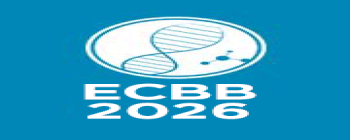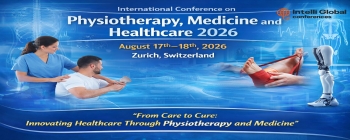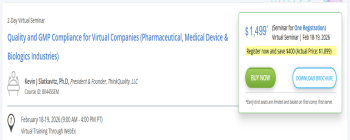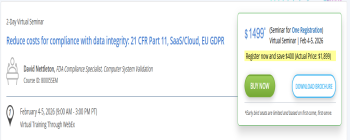Course Description:
The FDA governs the computer systems used to collect, analyze, transfer and report data that is in support of human clinical trials required for drug approval. FDA oversight is based on a Predicate Rule, known as "Good Clinical Practices," or simply, "GCPs."
Computer systems subject to GCP requirements must be thoroughly and appropriately validated in accordance with FDA's guidance on computer system validation. This involves a rigorous set of phases and steps to ensure that, in the language of FDA, "a system does what it purports to do."
The cost of adequately validating a clinical trial computer system can be high, and must be weighed against system risk and usage. GAMP 5 system classification guidelines can help ensure that a clinical trial system is categorized appropriately, based on the type of system and technology involved. Along with risk, system classification can provide a clear-cut pathway for validating a system, based on the appropriate level of testing and validation effort.
In this two day Virtual Seminar you will learn about FDA's expectations for classifying, assessing the risk, testing, and validating a computer system used in clinical trial work. You will learn in detail about the System Development Life Cycle (SDLC) methodology used to approach Computer System Validation (CSV), including all of the phases, sequencing of events, deliverables, and documentation requirements.
All types of clinical trial systems will be discussed, including in-house developed code, configurable systems and custom designed systems. Best industry practices and potential pitfalls in validating clinical trial systems, along with examples, will be covered in detail.
Ongoing maintenance of the system in a validated state will be discussed, as well as governance, archival and retirement.
We will also discuss the importance of applying good project management, business process re-engineering and organizational change management principles through the validation process and beyond..
Learning Objectives:
Upon completing this course participants should:
- Understand FDA requirements for clinical trial Computer System Validation (CSV)
- Understand the System Development Life Cycle (SDLC) approach to validation
- Utilize GAMP 5 system classification and risk methodologies for categorizing systems and developing a validation pathway
- Understand how to build a complete validation strategy and program for clinical trial systems
- Know how to manage the validation process and create FDA-compliant documentation
- Know how to monitor a clinical trial system that is in production, governing the data and system through retirement
- Understand the roles and responsibilities required to validate a clinical trial system
- Know how to measure cost vs. compliance risk for a clinical trial system
- Understand good project management principles, incorporating business process re-engineering and organizational change management into the process
- Know the policies and procedures that must be developed and maintained to support the clinical trial system in operation
- Understand how to leverage the vendor and other external resources to apply the best industry practices and avoid potential pitfalls when validating a clinical trial system
Who Will Benefit:
This seminar is intended for those working in the FDA-regulated industries, including pharmaceutical, medical device, biological, animal health, organ donation and tobacco. Functions that are applicable include research and development, clinical sample manufacturing, packaging, labeling and distribution, clinical testing and management, adverse events management and post-marketing surveillance.
You should attend this seminar if you are responsible for planning, executing or managing the implementation of any clinical trial system governed by FDA regulations, or if you are maintaining or supporting such a system. Examples of who will benefit from this webinar include:
- Data “Owners”
- Data “Stewards”
- Information Technology Analysts
- Information Technology Developers and Testers
- QC/QA Managers and Analysts
- Clinical Data Managers and Scientists
- Analytical Chemists
- Compliance and Audit Managers
- Laboratory Managers
- Automation Analysts
- Computer System Validation Specialists








